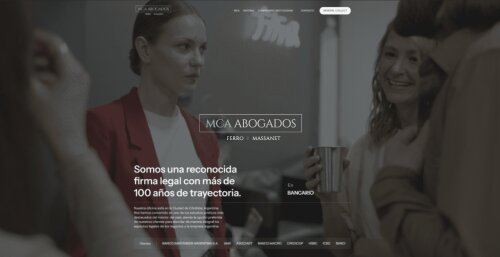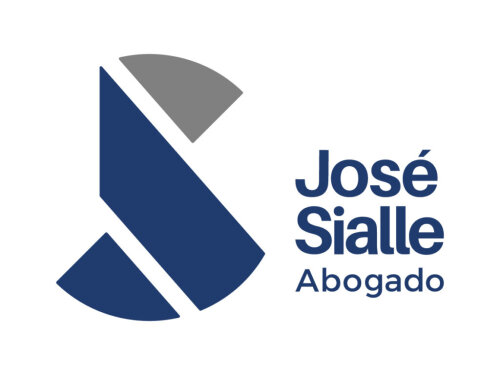Best Private Equity Lawyers in Córdoba
Share your needs with us, get contacted by law firms.
Free. Takes 2 min.
List of the best lawyers in Córdoba, Argentina
About Private Equity Law in Córdoba, Argentina
Private equity activity in Córdoba mirrors many national trends while reflecting local economic strengths - agriculture, food processing, industrial manufacturing, renewable energy and an expanding technology and services sector. Investors typically use private equity to acquire controlling or significant minority stakes in private companies, to finance growth, or to restructure businesses for sale or listing. Legal work in private equity combines corporate law, securities regulation, taxation, labor law and local administrative compliance.
In Córdoba, transactions are governed by Argentine federal law in many respects - for example corporate rules, securities regulation and tax - but provincial and municipal rules also matter. Practical legal issues include choice of vehicle and jurisdiction, fund and SPV formation, shareholder and shareholders' agreements, governance and control arrangements, regulatory filings and permits, tax planning and compliance with labor and environmental obligations.
Why You May Need a Lawyer
Private equity transactions are legally complex and highly negotiated. You may need a lawyer to structure the deal, protect your investment, achieve tax efficiency and ensure regulatory compliance. Lawyers help reduce commercial risk and increase certainty about outcomes.
Common situations where legal advice is essential include due diligence and risk allocation - identifying hidden liabilities and quantifying exposure; drafting and negotiating sale and purchase agreements - including representations, warranties, indemnities and escrow mechanics; structuring the ownership vehicle - deciding between sociedades anónimas, sociedades por acciones simplificadas or other entities; and preparing shareholders' agreements covering governance, veto rights, transfer restrictions and exit mechanics.
Other reasons to hire counsel include regulatory clearance and filing requirements, tax planning and compliance, employment and union issues, environmental and land use permits, intellectual property protection, anti-money laundering obligations and managing post-closing integration or disputes.
Local Laws Overview
Corporate law - Argentine corporate law sets the basic framework for company types, capital rules, director duties and corporate acts. The most common vehicles for private equity are sociedades anónimas and sociedades por acciones - the latter can provide more flexible and streamlined incorporation for certain investments. Provincial commercial registries, including the Registro Pblico de Comercio de la Provincia de Córdoba, handle company registration and filings at the provincial level.
Securities and capital markets - if a transaction involves public offerings, regulated securities or a later listing, national securities rules and supervision by the Comisión Nacional de Valores apply. Private placements and fundraisings also need to be structured to avoid unintended public-offer treatment.
Taxation - federal taxes are central - corporate income tax, value added tax and personal income tax on profits and dividends - plus withholding taxes on cross-border payments. Provinces impose taxes such as Ingresos Brutos - a gross receipts tax - and stamp taxes, which can materially affect deal economics. Proper tax structuring for fund vehicles, SPVs and exits is critical.
Foreign investment and capital controls - foreign investors can generally invest in Argentina but must observe registration, reporting and exchange control rules administered by the Central Bank and tax authority. Rules on remittance of dividends, capital repatriation and currency conversion can affect returns and timing.
Employment and labor law - Argentine labor law is protective of workers and can create substantial liabilities for buyers. Issues include collective bargaining agreements, severance obligations, mandatory benefits and continuity of employment in asset or share deals.
Anti-money laundering - obligations to detect and report suspicious transactions fall on financial intermediaries and on certain professionals. Compliance with the national financial intelligence unit is often part of investor and fund onboarding.
Competition and antitrust - large transactions that affect competition may require notification and clearance by national competition authorities. Industry-specific regulations - for example in energy, agriculture, health or transportation - may require permits or conforming to public procurement rules.
Frequently Asked Questions
What corporate vehicle is most common for private equity investments in Córdoba?
Investors commonly use sociedades anónimas or sociedades por acciones for operating companies, and special purpose vehicles for holding and financing. The choice depends on governance needs, tax planning, investor number and flexibility required - sociedades por acciones can be attractive for speed and reduced formalities, while sociedades anónimas may be preferred for complex governance or eventual public listings.
Do foreign investors face restrictions when investing in Córdoba?
Foreign investors can generally acquire companies or assets in Córdoba, but they must comply with national registration and reporting requirements and observe any sector-specific restrictions. Exchange control rules and tax withholding on outbound payments should be considered early in planning. Local counsel can advise on registration steps and timing for remittances.
What does due diligence typically cover in a private equity transaction?
Due diligence covers corporate records, financial statements and tax history, contracts and commercial obligations, employment and labor contingencies, litigation, intellectual property, regulatory permits and compliance, environmental liabilities, real estate titles and liens, and insurance. Legal due diligence aims to identify risks that should be addressed in transaction documents or pricing.
How are purchase price adjustments and indemnities handled?
Purchase price adjustments are negotiated mechanisms to reflect working capital, net debt or earn-outs at closing or post-closing. Indemnities and escrows allocate responsibility for breaches of representations and warranties and for identified contingent liabilities. Caps, baskets and survival periods are standard concessions that determine scope and duration of seller liability.
What tax issues should investors consider for exits?
Tax consequences depend on the structure used - whether the investment is held through local entities, offshore vehicles or a mix - and on the form of exit - share sale, asset sale or IPO. Capital gains treatment, withholding, stamp taxes and provincial taxes can all affect net proceeds. Pre-exit tax planning and clearance for repatriation of funds are important.
Are there special labor risks when acquiring companies in Córdoba?
Yes. Argentine labor law protects employees on transfers of business and recognizes significant severance and benefit rights. Collective bargaining agreements and union considerations can impose additional costs. A thorough labor due diligence and negotiations with unions, when relevant, reduce exposure.
What regulatory approvals may be needed?
Approvals depend on sector and transaction size. Antitrust clearance may be required for transactions with competition implications. Regulated sectors - energy, telecommunications, financial services, health and transportation - often require sector-specific permits or transfers. Local environmental and municipal permits may also apply for operations or real estate.
How long does a typical private equity transaction take in Córdoba?
Timeline varies with complexity and regulatory needs. A straightforward share purchase can close in a few weeks to a few months. Deals involving major regulatory clearances, complex restructuring, or cross-border coordination can take several months. Effective planning, timely document provision and local counsel coordination shorten timelines.
What should be included in a shareholders' agreement?
Key items include governance rules, board composition, voting thresholds, information rights, transfer restrictions and tag-along and drag-along rights, exit mechanics, anti-dilution provisions, dispute resolution procedures and deadlock-break mechanisms. Clear minority protection and exit triggers help avoid future conflicts.
How much does legal advice typically cost for private equity deals?
Costs vary widely by deal size and complexity. Smaller transactions may be handled on fixed or capped fees for specific stages - due diligence, contract drafting and closing. Larger transactions usually involve hourly billing or blended rates and can include retainers. Ask for fee estimates, billing structures and expected disbursements up front.
Additional Resources
National and provincial regulatory authorities and industry bodies are useful starting points for research and procedural requirements. Relevant institutions include the Comisión Nacional de Valores for capital markets regulation, the Central Bank for exchange rules, the federal tax authority for tax matters, and the Unidad de Información Financiera for anti-money laundering obligations. At the provincial level, the Dirección General de Rentas de la Provincia de Córdoba addresses provincial taxation, while the Registro Pblico de Comercio de la Provincia de Córdoba handles company registration matters.
Industry and market organizations can provide market intelligence and networking opportunities - for example the Bolsa de Comercio de Córdoba and local chambers of commerce. Professional associations - including the provincial Colegio de Abogados de Córdoba and national private equity associations - can help identify experienced practitioners and best practices.
Next Steps
If you need legal assistance with a private equity matter in Córdoba - start by preparing a concise deal summary - nature of investment, parties, structure contemplated, timing and main risks. Gather key documents - corporate records, financial statements, major contracts and permits - to allow an initial assessment.
Shortlist law firms or lawyers with proven experience in private equity and local knowledge of Córdoba - confirm their experience with similar transactions, regulatory clearances and tax planning. Request an initial consultation and a written engagement letter that sets out scope, fees, deliverables and confidentiality terms.
During the engagement, insist on a clear timeline and a due diligence checklist, and prioritize critical issues - regulatory approvals, major liabilities and tax exposures. Plan for post-closing integration and compliance monitoring, and consider mechanisms for dispute resolution. Remember that early legal involvement reduces surprises and increases the chances of a successful transaction.
Disclaimer - This guide provides general information and does not constitute legal advice. Consult a qualified lawyer in Córdoba for advice tailored to your specific situation.
Lawzana helps you find the best lawyers and law firms in Córdoba through a curated and pre-screened list of qualified legal professionals. Our platform offers rankings and detailed profiles of attorneys and law firms, allowing you to compare based on practice areas, including Private Equity, experience, and client feedback.
Each profile includes a description of the firm's areas of practice, client reviews, team members and partners, year of establishment, spoken languages, office locations, contact information, social media presence, and any published articles or resources. Most firms on our platform speak English and are experienced in both local and international legal matters.
Get a quote from top-rated law firms in Córdoba, Argentina — quickly, securely, and without unnecessary hassle.
Disclaimer:
The information provided on this page is for general informational purposes only and does not constitute legal advice. While we strive to ensure the accuracy and relevance of the content, legal information may change over time, and interpretations of the law can vary. You should always consult with a qualified legal professional for advice specific to your situation.
We disclaim all liability for actions taken or not taken based on the content of this page. If you believe any information is incorrect or outdated, please contact us, and we will review and update it where appropriate.













